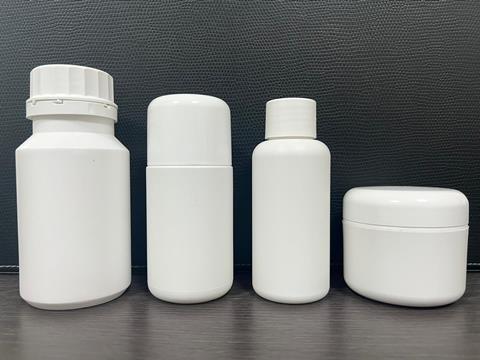
Spark Sourcing’s GEX bio-calcium has been granted a US patent that recognises the material – which is derived from eggshells – as environmentally friendly, waste-saving, and a manufacturing method that reportedly reduces plastic content by up to 50%.
To produce the GEX resin, eggshells undergo a multistep process to be transformed into an ultra-fine bio-calcium powder with particles as small as one micron, which is then pelletised. The resultant material can be blended with virgin plastic and achieve a plastic content reduction of between 30% and 50%, it is claimed.
GEX is also said to pair well with recycled plastics and bioplastics for the creation of sustainability-minded products. It is compatible with PP, PE, HDPE, PET, EVA, PS, ABS, RUBBER, PVC, and PLA, as well as processes such as injection moulding, blow moulding, film blowing, calendaring, thermoforming, and vacuum forming.
All products manufactured with the resin are apparently recyclable, and the resin aims to help companies meet upcoming plastic reduction mandates with its eco-certification for waste, plastic, and carbon reduction.
Reportedly cutting up to 70% of carbon emissions, it is said to offer a ‘superior’ product quality compared to mined calcium carbonate. It is apparently easy and affordable integration into existing manufacturing processes without damaging machinery due to its small particle size and resultant softness.
Alongside cosmetic, pharmaceutical, and industrial packaging and containers, GEX is applicable to household items, consumer goods, film rolls, bags, and more.
“For brands needing to meet plastic-reduction mandates or their own sustainability goals, GEX is an ideal option for them,” explains Andrew Bliss, founder of GEX Western Hemisphere distributor Spark Sourcing. “They do not need to change the shape, size, material, or design of their current product or packaging, or the subsequent shipping box size and shape. They can save huge amounts of time and money by simply and seamlessly incorporating GEX into their current manufacturing.”
The material has already been granted patents in the UK, Taiwan, and China, and an Australian patent is currently pending. It has been certified by SGS, which means it complies with waste, plastic, and carbon reduction standards; it also holds certifications from the EU RoHS and REACH programmes, and is certified as anti-bacterial with a high Far Infrared Radiation (FIR) emissivity rate.
ITC Packaging’s Bio2Bio bioplastic solution is designed to produce bottles, tubs, and other injection blow-moulded containers for the food and cosmetics markets. It makes use of non-fossil fuel materials produced from waste sourced from maize, beetroot, sugar cane crops, and other renewable sources.
Meanwhile, the European Bio-Uptake project, co-ordinated by Aitiip Centro Tecnológico and funded by the European Union, seeks to develop bio-based intermediates in a bid to integrate bioplastic composites into the European manufacturing industry and drive digitalisation.
If you liked this article, you might also enjoy:
The Lidl approach to packaging sustainability
How did Brazil achieve its 100% aluminium can recycling rate – and can it be replicated in the EU?
Experts have their say on the EU’s Packaging and Packaging Waste Directive revisions
A deep dive into the most important packaging sustainability trends and solutions














No comments yet